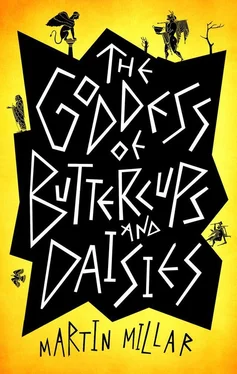Philippus slipped his mask up over his head. ‘Aristophanes! Are you sure this scene is necessary?’
‘It’s our big opening.’
‘I don’t like it.’
‘Why not?’
‘It’s undignified.’
‘I wouldn’t say that.’
‘I’m flying a gigantic dung beetle!’ cried Philippus. ‘How much more undignified could it be?’ He glared down at the playwright. ‘I am a serious actor, you know.’
‘You’re flying up to heaven to ask the gods to end the war. What could be more serious than that?’
The scene was a parody of the well-known story of the hero flying to heaven on the winged horse Pegasus. Aristophanes’ play started off with Philippus feeding the beetle more and more dung, till it was large enough for him to mount. His family questioned his sanity, but Philippus claimed to be the sanest person in Athens. He was sick of the war, and he planned to visit the gods, and ask them to end it.
‘Pegasus flying to heaven was serious,’ said Philippus. ‘This is farcical.’
‘Exactly!’ cried Aristophanes. ‘But I’m not really getting it from your performance. Try pulling on your phallus a little more when you’re steering. Get it waving around so the audience can see it.’
He left Philippus muttering about the time he’d been the lead actor in Oedipus , and what a mistake it had been to ever get involved with the crude comedies of Aristophanes.
‘He’s always the same,’ said Aristophanes to his assistant. ‘Always wants to be taken seriously.’
‘He’ll be fine once the crowd starts applauding. That always works like magic. Did you manage to squeeze any more money out of our choregos?’
‘I’m afraid not. Antimachus won’t cough up.’
Hermogenes shook his head. He was a few years older than Aristophanes, and he’d been in the theatre all his life. ‘It’s unusual for a producer to starve his production of funds. Being chosen as choregos is meant to be an honour.’
‘That’s what I told him, but it was no use. He’s still annoyed because I mildly lampooned him on stage.’
‘You grossly insulted him,’ said Hermogenes.
‘I wasn’t to know he had no sense of humour. I’ve grossly insulted most important men in the city, they don’t normally hold a grudge.
‘Kleon prosecuted you.’
Aristophanes scowled. That had been quite an affair. The leader of the pro-war faction had taken his revenge by prosecuting him for impiety. The playwright had been fined, and it could have been worse.
‘I’m sorry to say this about a fellow Athenian citizen, but I was relieved when he was killed last year.’
‘You weren’t the only one,’ said Hermogenes.
Many people thought that with Kleon gone, it might be easier to bring the war to an end, particularly as Brasidas, the Spartan war-leader, had also died in battle.
‘I really thought we’d make peace when they were both killed,’ said Aristophanes. ‘It was a great opportunity. But there seems to be no limit on how foolish the citizens of Athens can be. Kleon was a warmonger but Hyperbolus is even worse. Why do people listen to these demagogues?’
They paused for a while to watch the chorus go through the dance steps that introduced the last act of the play. Aristophanes had choreographed a very funny sequence involving a lot of phallus twirling, none of which seemed to be working out very well. The chorus was often a problem. They weren’t professionals, just honest citizens recruited for the festival. It often took some time to whip them into shape.
‘I think there’s more to it than just Antimachus hating me. He told me that certain important people don’t want me writing a play that promotes peace.’
‘I can guess who these certain important people are.’ Hermogenes frowned as two members of the chorus got their dance steps wrong and collided with each other. ‘Are you sure you want to insult Hyperbolus in this play? He’ll be in the audience with his supporters. It could lead to trouble.’
‘Hyperbolus is scum. He needs to be insulted.’
‘I wouldn’t exactly say that he was scum,’ said Hermogenes.
‘I can’t believe you’re still defending him!’ cried Aristophanes.
‘I come from a family of sailors. We’ve always supported the democratic faction.’
‘Can’t you see he’s nothing more than a self-serving loudmouth?’
‘I can see that he helped distribute food to the poor when the rich men of Athens weren’t doing much to help.’
Aristophanes and Hermogenes glared at each other. The argument might have gone further had not both realised that the last thing they needed was more friction in the rehearsal room.
‘Just keep me out of the court case. I have four children to support.’
Aristophanes didn’t know Hermogenes had four children. He had a vague memory he might have been at the birth celebrations for some of them.
Metris had admitted to Bremusa that she didn’t have the ability to locate anyone. That was true, as far as the nymph knew. There was no real reason that she should. Her mother had been a powerful being, but these powers were not always passed down. The world of the semi-divines — the cult heroes, spirits, nymphs, centaurs and all the rest — was not known to run on any logical system. Despite her supposed lack of power, Metris didn’t have any trouble locating Luxos. She could sense his presence. She walked south, down through the long walls, towards the port at Piraeus. Though keen to find him, she paused on her way to admire the Athenian statues, of which there were many. Metris loved the statues. They were vibrant, lifelike, imposing, and brightly coloured. All the best Greek sculptors had worked here.
Near the harbour, the surroundings were less pleasant. There were beggars on the streets and the air smelled of rotting fish. The houses were small and ramshackle, and what temples there were seemed badly in need of repair.
Metris spotted Luxos sitting on a small hillock. She smiled at the sight of his thick, tousled hair. Who had hair like that? No one she’d ever seen. She could sense his sadness. He was playing his lyre, and though his playing didn’t quite compare with the music of the water nymphs, which was so beautiful it could lure a man to his death, it was heartfelt and moving. Metris could see the sad aura emanating from Luxos as he sat on his own on the dusty ground. She walked up to him and laid her hand on his shoulder. His tunic was so threadbare she could feel his skin through the fabric.
‘You’re sad.’
He nodded. ‘No one will listen to my poetry.’
She sat down beside him. ‘I’ll listen.’
‘Really?’
Metris had never seen such a dilapidated lyre. It was nothing like the fine instruments of the water nymphs. But the young poet knew how to play it. He recited a rather sad poem about the loss of a parent, accompanying his words with a few gentle notes.
‘What’s your name?’ asked Metris, after he’d finished.
‘Luxos.’
‘I’m Metris.’
Quite abruptly, she kissed him. The air grew warm, and a great carpet of buttercups and daisies blanketed the hillock.
‘I like your poetry.’
‘I like your flowers.’
Metris took a strand of his funny blond hair in her fingers. ‘Who could resist your poetry?’
‘The whole of Athens. Aristophanes says I’m not the right sort of person. I just realised he’s probably correct.’
Luxos had such a pretty face. Metris had never seen such a pretty youth.
‘I wouldn’t mind so much, but I’d like to have been given a chance before I get killed in battle.’
‘Battle?’ Metris was surprised. ‘Surely you don’t go to war?’
‘Everyone in Athens goes to war. Farmers, philosophers, carpenters, poets — everyone. The order comes out, you turn up with three days’ rations, and off you go.’
Читать дальше












